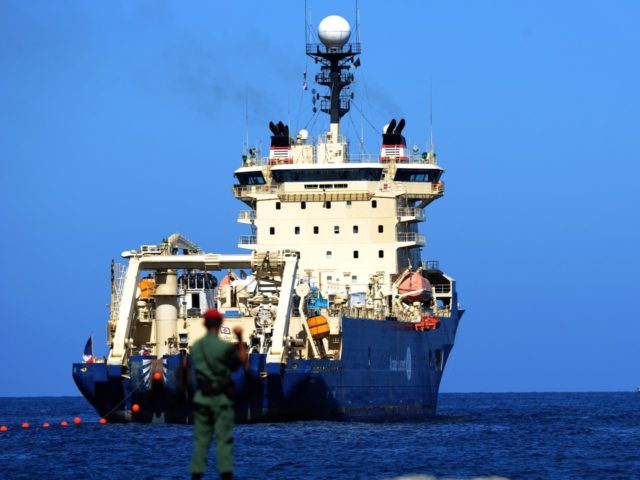The Wall Street Journal reported on Wednesday the U.S. Justice Department (DOJ) is attempting to block the construction of an undersea cable linking Los Angeles to Hong Kong due to national security concerns.
The 8,000-mile, $300 million undersea cable would be a joint project between Google, Facebook, and a Chinese investor called Dr. Peng Telecom & Media Group. The goal of the project, formally known as the Pacific Light Network, is to establish high-speed Internet connectivity between the U.S., Hong Kong, China, Indonesia, Malaysia, and the Philippines, improving traffic speed for all participants.
The Justice Department is reportedly concerned about the Chinese investor, as well as the security implications of linking L.A. systems directly to Hong Kong.
The WSJ wrote that if the project is blocked, it could “rewrite the rules of Internet connectivity between the U.S. and China.”
DOJ is part of an inter-agency review process for telecommunications issues that has approved numerous other projects with Chinese investors and partners in the past. If this undersea cable is permanently blocked, it would be the first time permission has been denied for such a project.
Google (or more precisely its parent company, Alphabet Inc.) requested permission to begin work on the Hong Kong-L.A. cable in 2017 and obtained temporary permits for preliminary construction and testing, but the Justice and Defense Departments asked the Federal Communications Commission (FCC) to delay final approval until a national security review could be completed. The review is still officially in progress with no fixed completion date.
The Justice Department’s concerns about Dr. Peng Telecom & Media Group might be due to its partnership with Huawei, the Chinese telecom giant that has been effectively banned from doing business with U.S. firms due to suspicions its equipment could be compromised by Chinese intelligence agencies.
The Trump administration has rejected over 130 requests by American companies to trade with Huawei due to national security concerns. Although President Donald Trump indicated some exemptions to the ban would be permitted, none appear to have been granted so far.
Another reason for DOJ’s opposition to the cable cited by the Wall Street Journal is apprehension that Hong Kong could be on the verge of losing its special semi-autonomous status and the U.S. trade privileges that go along with it.
The chairman of the Dr. Peng corporation, Yang Xueping, has worked for the Chinese Communist government in several capacities. One of those postings was an official position in Shenzhen, the tech hub city on Hong Kong’s border where China has been ostentatiously rehearsing for a police or military crackdown on Hong Kong protesters.
Subsidiaries of Dr. Peng have worked on surveillance projects for the Chinese government, and the company has partnered with Huawei to work on 5G networking and artificial intelligence, two technologies of great concern to U.S. national security.
Most media reactions to the Wall Street Journal story include speculation that the Trump administration is delaying the final stages of the largely-completed undersea cable project as part of the overall trade war with China. Google and Facebook have said hundreds of millions of dollars could be lost if the connection to Los Angeles is forbidden.
The FCC has final approval and could conceivably disregard recommendations from the Justice and Defense Departments, but it rarely does so. If the connection to L.A. is approved, the cable is so close to completion that it could still go into service by the end of 2019.
Justice Department officials and company representatives for Google, Facebook, and Dr. Peng all refused to comment on the Wall Street Journal story.
“DOJ does not comment on its ongoing assessment of applications that the FCC has referred for national security and law enforcement concerns arising out of foreign investment or control,” a DOJ spokesman told Reuters on Wednesday.

COMMENTS
Please let us know if you're having issues with commenting.